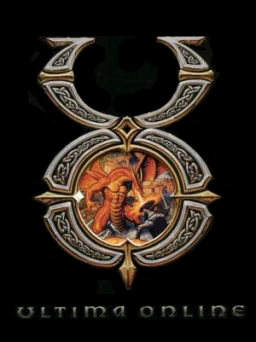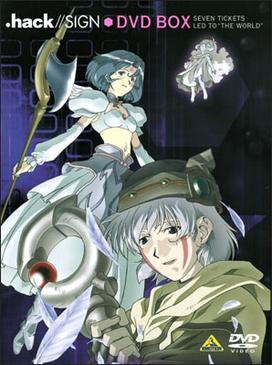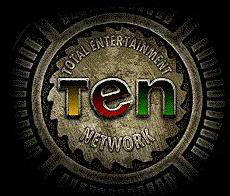
EverQuest is a 3D fantasy-themed massively multiplayer online role-playing game (MMORPG) originally developed by Verant Interactive and 989 Studios for Windows PCs. It was released by Sony Online Entertainment in March 1999 in North America, and by Ubisoft in Europe in April 2000. A dedicated version for Mac OS X was released in June 2003, which operated for ten years before being shut down in November 2013. In June 2000, Verant Interactive was absorbed into Sony Online Entertainment, who took over full development and publishing duties of the title. Later, in February 2015, SOE's parent corporation, Sony Computer Entertainment, sold the studio to investment company Columbus Nova and it was rebranded as Daybreak Game Company, which continues to develop and publish EverQuest.

Ultima Online (UO) is a fantasy massively multiplayer online role-playing game (MMORPG) released on September 24, 1997 by Origin Systems.

.hack//Sign is a Japanese anime television series directed by Kōichi Mashimo, and produced by studio Bee Train and Bandai Visual, that makes up one of the four original storylines for the .hack franchise. Twenty-six original episodes aired in 2002 on television and three additional bonus ones were released on DVD as original video animation. The series features each characters designed by Yoshiyuki Sadamoto, and written by Kazunori Itō. The score was composed by Yuki Kajiura, marking her second collaboration with Mashimo.
.hack is a series of single-player action role-playing video games developed for the PlayStation 2 console by CyberConnect2 and published by Bandai Namco Entertainment. The four games, .hack//Infection, .hack//Mutation, .hack//Outbreak, and .hack//Quarantine, all feature a "game within a game", a fictional massively multiplayer online role-playing game (MMORPG) called The World which does not require the player to connect to the Internet. Players may transfer their characters and data between games in the series. Each game comes with an extra DVD containing an episode of .hack//Liminality, the accompanying original video animation (OVA) series which details fictional events that occur concurrently with the games.

Origin Systems, Inc. was an American video game developer based in Austin, Texas. It was founded on March 3, 1983, by Richard Garriott and his brother Robert. Origin is best known for their groundbreaking work in multiple genres of video games, such as the Ultima and Wing Commander series. The company was purchased by Electronic Arts in 1992.

Gold Box is a series of role-playing video games produced by SSI from 1988 to 1992. The company acquired a license to produce games based on the Advanced Dungeons & Dragons role-playing game from TSR, Inc. These games shared a common game engine that came to be known as the "Gold Box Engine" after the gold-colored boxes in which most games of the series were sold.
A massively multiplayer online game is an online video game with a large number of players on the same server. MMOs usually feature a huge, persistent open world, although there are games that differ. These games can be found for most network-capable platforms, including the personal computer, video game console, or smartphones and other mobile devices.
Player versus player (PvP) is a type of multiplayer interactive conflict within a game between human players. This is often compared to player versus environment (PvE), in which the game itself controls its players' opponents. The terms are most often used in games where both activities exist, particularly MMORPGs, MUDs, and other role-playing video games, to distinguish between gamemodes. PvP can be broadly used to describe any game, or aspect of a game, where players compete against each other. PvP is often controversial when used in role-playing games. In most cases, there are vast differences in abilities between players. PvP can even encourage experienced players to immediately attack and kill inexperienced players. PvP is often referred to as player killing in the cases of games which contain, but do not focus on, such interaction.

An online game is a video game that is either partially or primarily played through the Internet or any other computer network available. Online games are ubiquitous on modern gaming platforms, including PCs, consoles and mobile devices, and span many genres, including first-person shooters, strategy games, and massively multiplayer online role-playing games (MMORPG). In 2019, revenue in the online games segment reached $16.9 billion, with $4.2 billion generated by China and $3.5 billion in the United States. Since the 2010s, a common trend among online games has been to operate them as games as a service, using monetization schemes such as loot boxes and battle passes as purchasable items atop freely-offered games. Unlike purchased retail games, online games have the problem of not being permanently playable, as they require special servers in order to function.

Mythic Entertainment was an American video game developer based in Fairfax, Virginia that was most widely recognized for developing the 2001 massively multiplayer online role-playing game Dark Age of Camelot. Mythic was a prolific creator of multiplayer online games following its establishment in the mid-1990s.

An owlbear is a fictional creature originally created for the Dungeons & Dragons fantasy role-playing game. An owlbear is depicted as a cross between a bear and an owl, which "hugs" like a bear and attacks with its beak. Inspired by a plastic toy made in Hong Kong, Gary Gygax created the owlbear and introduced the creature to the game in the 1975 Greyhawk supplement; the creature has since appeared in every subsequent edition of the game. Owlbears, or similar beasts, also appear in several other fantasy role-playing games, video games and other media.

Pogo.com is a free online gaming website that offers over 50 casual games from brands like Hasbro and PopCap Games. It offers a variety of card and board games to puzzle, sports and word games. It is owned by Electronic Arts and is based in Redwood Shores, California.

Dark Sun: Shattered Lands is a turn-based role-playing video game that takes place in the Dungeons & Dragons campaign setting of Dark Sun. It was developed and published by Strategic Simulations in 1993. It received positive reviews although released initially in an unfinished state. The game had a sequel, Dark Sun: Wake of the Ravager, in 1994. An online MMORPG taking place in the same setting, Dark Sun Online: Crimson Sands, was released in 1996 and hosted on the T.E.N. Network.

Don Daglow is an American video game designer, programmer, and producer. He is best known for being the creator of early games from several different genres, including pioneering simulation game Utopia for Intellivision in 1981, role-playing game Dungeon in 1975, sports games including the first interactive computer baseball game Baseball in 1971, and the first graphical MMORPG, Neverwinter Nights in 1991. He founded long-standing game developer Stormfront Studios in 1988.

Total Entertainment Network (TEN) was an online gaming service that existed from September 1996 until October 1999. T E Network, Inc., which created and operated the TEN service, was formed from the merger of Optigon Interactive and Outland in June 1995 when they received their first round of venture capital funding from Vinod Khosla, a general partner at Kleiner Perkins Caufield & Byers.

Al-Qadim: The Genie's Curse is an action role-playing game for the personal computer set in the Al-Qadim campaign setting of Advanced Dungeons and Dragons. The game was developed by Cyberlore Studios and published in 1994 by Strategic Simulations (SSI). The game combines role-playing game and adventure with a simplified interface; the player's character is a young corsair trying to clear his family's name, rescue his betrothed and determine who has been freeing genies from their masters.
The history of massively multiplayer online games spans over thirty years and hundreds of massively multiplayer online games (MMOG) titles. The origin and influence on MMO games stems from MUDs, Dungeons & Dragons (D&D) and earlier social games.

Ravenloft: Stone Prophet is a fantasy role-playing video game developed by DreamForge Intertainment for MS-DOS and published by Strategic Simulations in 1995.

David Allen is a video game designer and entrepreneur who is most recently known as the creator of Alganon, a fantasy based MMORPG developed by Quest Online, a company he co-founded in 2006.
Nine full expansion packs for the MMORPG Ultima Online have been released. The first, Ultima Online: The Second Age, arrived in 1998. The most recent expansion pack is Ultima Online: Time of Legends (2015).














